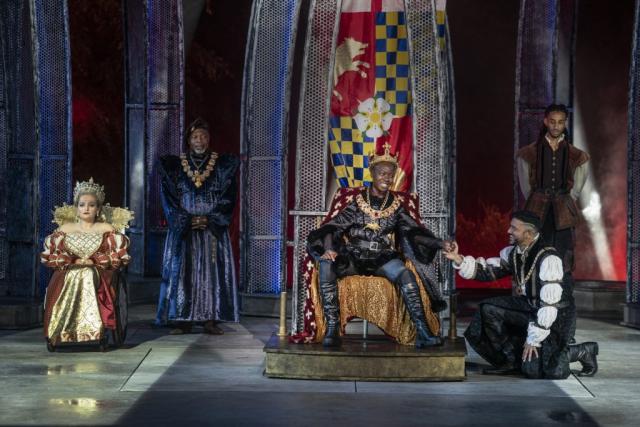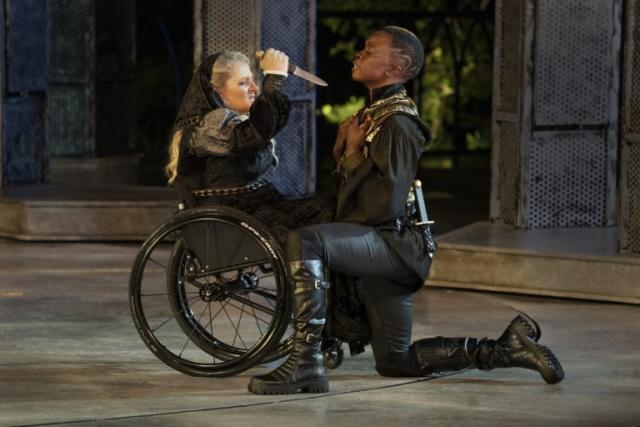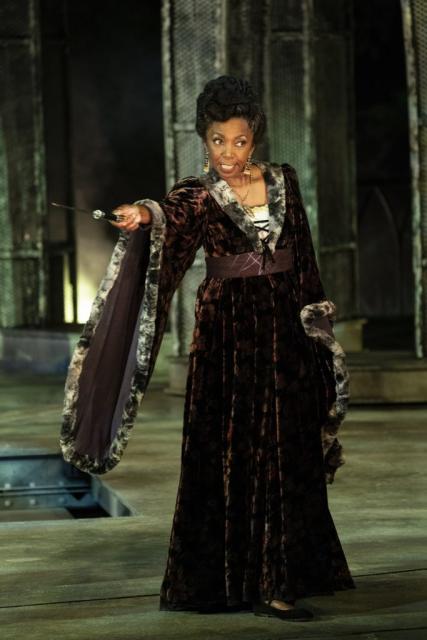


There have been female Hamlets (most notably Sarah Bernhardt, Diane Venora, and Ruth Negga), female King Lears (Glenda Jackson on Broadway and the West End), and even a female Richard II (Fiona Shaw). But the new Free Shakespeare in the Park production of Richard III is probably the first to feature an actress in the lead role of the most vile of the Bard’s villains. Danai Gurira, an award-winning playwright (Eclipsed) and an actress best known for her bad-ass heroine roles on TV’s “The Walking Dead” and in Marvel Universe franchise films, brings the requisite snark and unrestrained relish in savoring the character’s bloodthirsty deviousness.
Director Robert O’Hara has made some inventive staging and casting choices but too often sacrifices Shakespeare’s points on unchecked ambition for the sake of laughs and talking down to the audience. (Richard’s brother Clarence is now called Georgie, presumably to make the text easier to understand.) This Richard is an entertaining and highly theatrical evening, but it fails to attain the full impact of an indictment of overweening corruption and power.
O’Hara, known for his edgy productions of his own plays like Bootycandy and Barbecue and similar sharp satires like Jeremy O. Harris’s Slave Play, gives us a gender-blind Richard, but not a color-blind one. Gurira plays the twisted, narcissistic Duke of Gloucester as male, yet the fact that the role is played by a woman subtly adds to the character’s outsider status. O’Hara chooses to emphasize her race as a motivation for treachery. During the “Now is the winter of our discontent” speech, when Richard speaks of his deformed body, Gurira indicates her black skin as the handicap that keeps him from attaining love and position, unlike his siblings enacted by white actors.
Gurira does not play Richard as having physical defects and, interestingly O’Hara has surrounded her with performers with physical challenges. Gregg Mozgala, who has Cerebral Palsy and walks with a limp, doubles as Richard’s brother King Edward IV and Richmond, who slays Richard and goes on to become Henry VII. So, ironically, a limping actor defeats the villain normally played as having a limp. (Mozgala is suitably commanding as Richmond.)
Similarly, Richard’s mother is enacted by a deaf actress (Monique Holt) in a silently eloquent performance and Lady Anne, Richard’s unfortunate wife, is taken on by Ali Stroker, who as Ado Annie in the recent Oklahoma! revival, was the first performer in a wheelchair to win a Tony Award. Perhaps by this casting, O’Hara is saying Richard’s flaws are all internal and his mind has been diseased by perceived racism rather his body by physical ailments.
Stroker exhibits power and passion in her initial wooing scene with Richard, but O’Hara has added too many broad comic touches for the encounter to be entirely effective as a depiction of Richard’s terrifying trail of treachery. Now when Richard threatens to slay himself for Anne’s love, it’s revealed the knife has a retractable blade and the two incongruously guffaw. Then when Richard slips a ring on Anne’s at-first unwilling finger, Stroker overplays her stunned lust for the dazzling rock. There are many other examples of broad comic mugging, particularly in the sequence where Richard manipulates the populace of London to advocate for his ascent to the throne, which throws the show off balance.
O’Hara does make clever use of Myung Hee Cho’s revolving set and trapdoors with the various figures involved in court intrigue spinning around and descending into nether regions, but not nearly enough. Likewise, Elisheba Ittoop’s unsettling sound design of constant warfare played before the opening establishes the proper atmosphere of dread, but it’s not employed as frequently as it should be during the action.
There are also spicy confrontations between Sharon Washington’s steely Margaret and Heather Alicia Simms’s haughty Elizabeth. When these two queens battle it out, the sparks fly. Sanjit De Silva’s Buckingham and Ariel Shafir’s Hastings have power while Michael Potts’ Stanley conveys the appropriate dignity.
There is much to enjoy in this innovative production, but a little less comedy and more court intrigue would have served the play better. Gurira does deliver a solid, frightening Richard, perhaps opening the doors for more non-traditional casting in future classic productions.
